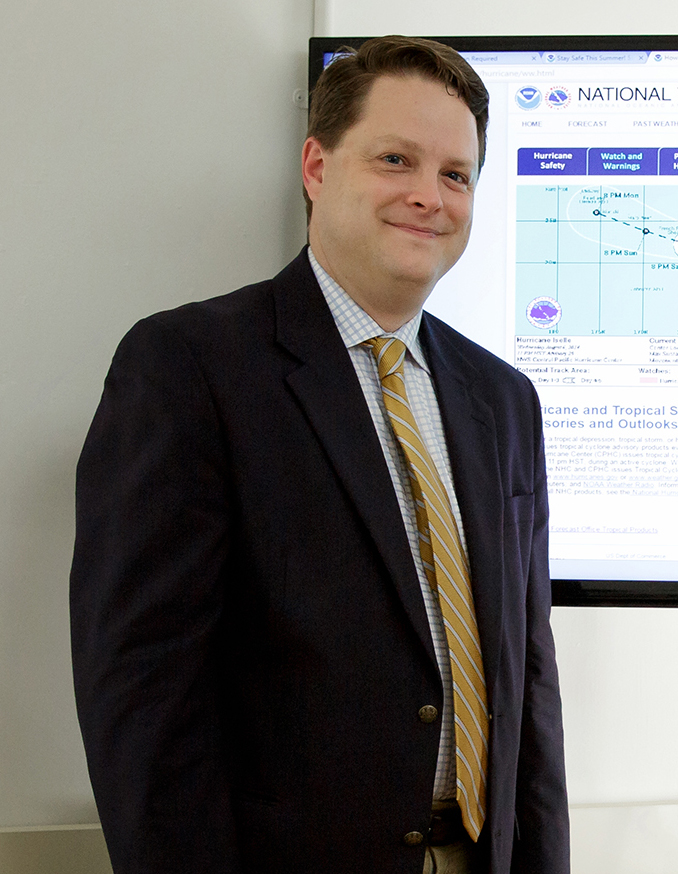Sam Adams handles COVID regulations on campus while also taking classes towards his Ph.D. Photo from uritoday.com
Imagine being both a student and in charge of an emergency that affects every single person at your job.
That is the case for Director of Emergency Management and the Assistant Director of Public Safety Samuel Adams.
“It’s been exceptionally difficult,” Adams said on juggling being a student and managing the school’s COVID-19 response effort. “I’m taking a very light course load this fall because I knew I was going to be busy and I’ve had to miss things because of meetings that can’t be rescheduled.”
He is currently a second-year student in the department of marine affairs pursuing a Ph.D. in climate adaptation and resilience. He is currently researching the relationship between climate change and emergency management with an emphasis on the resilience of coastal communities with respect to hurricanes and severe weather.
During his six years in his position, Adams has been in charge of running the emergency management program and overseeing the non-law enforcement sector of public safety. Emergency management is responsible for coordinating events like power outages and snowstorms, but for the past several months, managing the school’s coronavirus response has been the primary focus.
In addition to overseeing emergency management, Adams is also co-chair of the University of Rhode Island’s COVID-19 taskforce alongside Director of Health Services Ellen Reynolds.
Adams and his department began taking steps to manage the coronavirus back in late February when students started returning from trips in Asia. As the pandemic continued to progress, emergency management led a centralized procurement effort of masks, disinfectant, wipes, hand sanitizer and gloves and worked with facility services to place hand sanitizer, wipes and gloves at various places in buildings on campus. Adams also worked with Communications and Marketing to create signage in buildings around campus.
The biggest question heading into the summer and the new school year for Adams, his staff and many around the University were how the virus would progress, and how students would respond to the measures put in place on campus.
“The biggest challenge was dealing with uncertainty,” Adams said. “We had to be prepared for a lot of different scenarios because we’re still learning a lot about the virus.”
Currently, the department has been tasked at managing URI’s COVID-19 supply stockpile, overseeing any on-campus events and activities that need to be approved, keeping building preparation guides updated as well as managing mandatory COVID-19 testing that have occurred on campus over the last two weeks.
According to the URI COVID-19 tracker, there have been approximately 400 positive cases on campus since Aug. 25 with a positivity rate of two percent. With exception to the Greek Life shelter-in-place order, Adams is extremely proud of how things are going on campus and is optimistic that classes will be able to finish on-campus instruction in November.
Emergency Management Specialist Brian Smith who works closely with Adams, praised his desire to help the University navigate the COVID-19 pandemic, all while making his personal pursuit for higher education.
“Sam’s leadership in preparing the University for the COVID-19 epidemic has been outstanding,” Smith said. “He quickly organized the different departments to respond and work together to ensure the campus was safe for the students, faculty and staff to return.”
Emergency management has also begun the process of planning for the spring semester. These plans include continuing to support surveillance testing and coming up with a potential vaccine site when they become available.
“Part of my job at emergency management is to look ahead and I like to avoid surprise as much as I can,” Adams said.
Overall, Adams is extremely proud of his team at emergency management and the University community for how creative and relentless they have worked to create a safe environment.
“I have an amazing team here at emergency management,” Adams said. “I think we do amazing work, but none of what has been accomplished here would happen without amazing contributions by every single unit of the University.”





